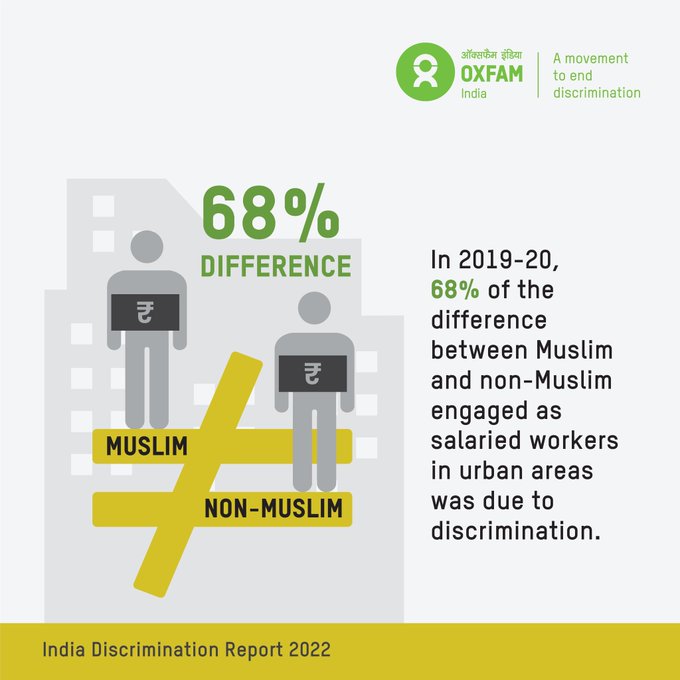Last Updated on September 18, 2022 1:04 am by INDIAN AWAAZ

AMN / NEW DELHI
Oxfam India’s latest ‘India Discrimination Report 2022’ has revealed that Muslims in India continue to face multidimensional challenges in accessing salaried jobs and income through self-employment as compared to non-Muslims.

India Discrimination Report 2022 highlights bias in accessing jobs livelihoods and agricultural credits. The report also states that 15.6% of the Urban Muslim population aged 15 and above were engaged in regular salaried jobs whereas 23.3% of Non-Muslims were engaged in regular salaried jobs. These stats are of 2019-20.
“The lower employment for urban Muslims attributes 68% to discrimination. In 2019-20, 70% of the difference between Muslim and non-Muslim engaged as salaried workers was due to discrimination,” it said.
The report further states that self-employed SC/ST people earn Rs 5,000 less than non-SC/ST people. Discrimination here accounts for 41% of this gap.
The report further states that the rural SC/ST population is facing high discrimination in employment the report states.
Data showed an unequal income among rural SC and ST casual wage workers was majorly 79% because of discrimination in 2019-20, a sharp increase of 10% from the previous year.
In rural areas, Muslims witnessed a 17% hike in unemployment in the first quarter of COVID.
For salaried workers during Covid, Muslims emerge as the most affected group for which the percentage figures went up from 11.8 to 40.9 in rural areas, the corresponding increase for SC/ST (5.6 to 28.3) and general category (5.4 to 28.1) being less than that, it said.
Regular-salaried non-Muslims in urban areas earn INR 20,346 on average which is 1.5 times higher than Muslims who earn INR 13672. This means non-Muslims are earning 49 percent more than Muslims in regular employment, the report noted. Self-employed non-Muslims earn INR 15878 on average while self-employed Muslims earn INR 11,421 despite the overrepresentation of Muslims in urban self-employment. This means non-Muslims are earning a third more than Muslims in self-employment.
“The fall-out of discrimination in our society is multi-faceted, not just social and moral but also economic leading to adverse consequences to society. Oxfam India is looking forward to the active engagement and dialogue among government and political parties, policymakers and civil societies, and all other stakeholders that are in pursuit of a just society and to collectively move towards the building of a discrimination-free India”, said Amitabh Behar.
